#Ethics and Responsibility
Explore tagged Tumblr posts
Text
The Philosophy of the Face
The philosophy of the face delves into the significance of the face as both a physical and symbolic representation of identity, expression, ethics, and human interaction. The face holds profound philosophical meaning, often considered a site where individuality, sociality, and ethical responsibilities converge.
Key Themes in the Philosophy of the Face:
Identity and Subjectivity:
The face is the most recognizable and unique feature of a person, serving as a primary means of identifying and distinguishing individuals. Philosophically, the face represents individual subjectivity and personhood. It is often tied to the idea of selfhood and how we understand ourselves and others as distinct beings.
Thinkers such as Emmanuel Levinas have emphasized the face as a central aspect of ethical relations. For Levinas, encountering another’s face is a direct confrontation with their humanity, which demands responsibility and ethical consideration.
Expression and Emotion:
The face is the primary medium through which humans convey emotions such as joy, sadness, anger, and surprise. Philosophers of mind and emotion, like Charles Darwin in The Expression of the Emotions in Man and Animals, have studied how the face communicates internal states.
The face also plays a key role in nonverbal communication and body language. Merleau-Ponty, in his phenomenology of perception, views the face as part of our embodied experience, where internal states are manifested externally in the physical world.
The Face and Ethical Responsibility:
In Levinas’s philosophy, the face-to-face encounter is the foundation of ethical relations. The face of the other calls us to responsibility, evoking a moral imperative to recognize their vulnerability and dignity. This idea contrasts with objectifying others, where the person is reduced to a thing rather than recognized in their full humanity.
The face, in Levinas’s ethics, is unavoidably tied to vulnerability. Seeing another’s face can invoke a sense of empathy and care, demanding that we treat the other as more than just an object or a means to an end.
The Gaze and Power:
Jean-Paul Sartre, in his work on existentialism, discusses the concept of the gaze. The idea is that when someone looks at us, we become aware of ourselves as objects in their perception. The gaze of another can be experienced as oppressive or objectifying, leading to feelings of shame or discomfort.
The face is the focal point of the gaze, and philosophers like Michel Foucault have explored how visual power dynamics—like surveillance—operate through the act of looking. The face becomes a site of control and regulation in social contexts.
Facial Recognition and Social Interaction:
In social philosophy, the face is a crucial component of how we interact with and recognize others. Recognition theory, explored by philosophers like Axel Honneth, focuses on the importance of mutual recognition in shaping personal identity and self-esteem. The face plays a central role in these processes of acknowledgment and affirmation.
Social norms about facial expressions also shape interactions. For instance, in certain cultural contexts, smiling or maintaining eye contact is a form of politeness, while in others, it may signify dominance or intrusion.
The Mask and Concealment:
The face is often considered a symbol of authenticity, but the act of masking the face introduces questions about identity and deception. Masks, both literal and figurative, can conceal the true self, leading to philosophical inquiries about authenticity and self-presentation.
In postmodern philosophy, thinkers like Jacques Derrida and Gilles Deleuze question whether the face can ever fully reveal the self. Instead, the face may be seen as a surface, a construct that conceals as much as it reveals.
Facial Alteration and Technology:
With advances in plastic surgery, facial recognition technology, and artificial intelligence, the face has become a subject of technological and ethical debate. The ability to alter, enhance, or track faces raises questions about identity, privacy, and authenticity.
Transhumanist philosophers discuss the role of technology in altering human bodies, including the face, and what that means for personal identity. Facial modification challenges the idea that the face is a static, natural marker of identity.
The Face and Beauty:
The face is a primary site for judgments of beauty, and philosophers have long debated the nature of beauty and its relation to human worth. Aesthetic philosophy considers how facial symmetry, proportion, and expression contribute to perceptions of beauty.
Feminist philosophy critiques the societal emphasis on women’s faces as objects of beauty, exploring how cultural norms around appearance can lead to objectification and unrealistic standards that shape individual self-worth.
The Face in Art and Representation:
Throughout history, the face has been a central subject in art. Portraits, sculptures, and photographs focus on capturing the essence of a person through their facial features. Philosophers of art, such as Arthur Danto and Theodor Adorno, explore how the representation of the face in art reflects deeper truths about human existence.
The face in art can reveal vulnerability, character, and emotion, serving as a window into the subject’s inner life. Artists like Rembrandt and Picasso have used the face to explore deeper psychological and existential themes.
The Face and Memory:
The face plays a crucial role in how we remember and recognize others. Phenomenology and cognitive science explore the significance of the face in memory and the emotions tied to recognition.
Faces are tied to personal history and relationships. The memory of a face can evoke emotions, both positive and negative, shaping our interactions and relationships.
The philosophy of the face encompasses a wide range of issues related to identity, expression, ethics, and social interaction. The face is a powerful symbol of human individuality and vulnerability, playing a central role in communication, recognition, and ethical responsibility. Philosophers across various traditions explore the face as a site where personal and interpersonal meaning is created, raising important questions about how we understand ourselves and others in social and ethical contexts.
#philosophy#epistemology#knowledge#learning#education#chatgpt#ontology#metaphysics#psychology#Philosophy of Identity#Ethics and Responsibility#Nonverbal Communication#Existentialism and the Gaze#Phenomenology of Expression#Social Power and the Face#Aesthetics and Beauty#Recognition and Memory#Technology and Facial Alteration
4 notes
·
View notes
Text
#Tags:Drone Operations#Drone Safety#Ethics and Responsibility#facts#Federal Law#Federal Property#Legal Consequences#life#National Security#Podcast#Public Safety#Reckless Endangerment#serious#truth#website
0 notes
Text
Reminder to avoid buying anything crochet new from big stores. Crochet (unlike knit) CANNOT be done by a machine and must be done by an actual human being. The person who made it was definitely not paid an appropriate amount for their labour. Most big stores use sweatshops anyway and I know it’s hard to completely avoid buying anything from a major store. But if those specific items don’t sell, we can send a message to companies that we don’t want items made fully by hand using slave labour
This summer, avoid any new crochet items. You don’t need THAT specific top that badly
#crochet#knit#box stores#capitalism#human rights#fair trade#sweatshop#boycott#social justice#ethical shopping#shopping#shein#american eagle#h&m#Walmart#hollister#shopping haul#try on haul#gap#old navy#Joe fresh#responsible consumption#responsible shopping#sweatshops#slave labor
4K notes
·
View notes
Text
man you all were not kidding abt the therapyspeak in veilguard.
#cant believe taash stops themselves from calling emmrich a skullfucker#i shouldve been allowed to encourage that behavior. honestly. consequnces be damned#if you say you saw this coming they both get irritated that you didn’t say something ahead of time????#why is your relationship my responsibility. we have bigger things to worry about#datv critical#& honestly why is it so important everyone gets along. that isn’t really necessary#and it’s boring frankly#much more interesting to travel with two people who openly hate each other but agree to follow you#bc they care about either the mc or the quest they’re on#can you imagine how bad da2 wouldve been if you couldve been like#okay deep breaths fenris. tell me what you’re feeling right now#and instead of telling you to kill yourself he was like#‘you’re right hawke. im letting my trauma get in the way of a beautiful friendship with anders’#‘lets agree to just not talk about mages and templars’#probably not a great comparison bc tassh & emmrich’s disagreements dont have much to do with the main plot#but then like even more reason for it not to matter either way.#also why are we glossing over the necromancy stuff#why is the solution like ‘this is an uncomfortable topic so we just won’t discuss it anymore’#they could be having a rly interesting disagreement about the ethics of all this#but they cant because everyone in veilguard has to be Best Friends for some reason#da
365 notes
·
View notes
Text
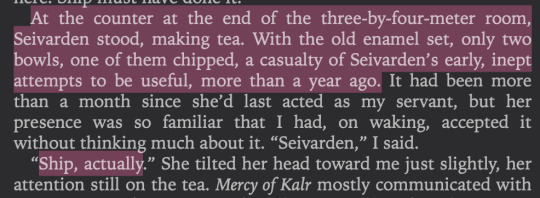
seivarden "weird coping mechanisms" vendaai is like "i'm having trouble processing my emotions right now so i'm going to engage in service roleplay for the person (ship?) i'm in love with, while the ship (person?) that i'm a lieutenant on board steers me around and speaks through me like a puppet. i find this soothing and reassuring for normal reasons don't worry about it."
#i love you. girl who is Coping.#like. i totally get why she does this#she's still completely fucking unmoored and doesn't trust her own understanding of how the world is supposed to work#w.r.t. class systems and justice and even like. other people's feelings and interiority.#and also doesn't trust her ability to make the right decision.#nor has she yet developed a particularly coherent framework of ethical decisionmaking to replace what she's lost#(or even how to interact with other people without unintentionally pissing them off by acting thoughtless or entitled)#beyond 'i guess i'll just follow breq and do what breq thinks is right because breq is better than me.'#so it's obviously very comforting for her to have that responsibility and autonomy temporarily taken away from her#can't fuck up your whole life or lose your place in the world and the people who are important to you (again)#can't make the wrong call in a high stakes situation and get the crew under your command killed#can't accidentally offend your girlfriend or incur judgement and criticism from your most important person.#you don't have to be perfectly steady or unfailingly proper and just or even particularly nice if you're just doing what ship tells you.#imperial radch
237 notes
·
View notes
Text
I do not now, nor have I ever, expected Gideon to take a principaled stance on the forever war. I just don't think it matters to her. Ostensibly she's on her dad's side because her dad has been on a parenting kick lately, and the best she ever got from her mum was goodbye with a stay of execution. But if she were confronted with the ethics of the situation? Asked her opinion? I don't think she'd have one. She may be a prince, but at heart she's still the abused eighteen year old girl who fought tooth and nail to join the army just for a way out
#we've got other characters to have political opinions#paul. coronabeth. ianthe. even pyrrha#gideon is as she has always been—in survival mode#she has the political consciousness of an eggplant emoji#and I don't think that's changing any time soon#I don't WANT that to change any time soon#she neither deserves nor is equipped for large-scale ethical responsibility#the locked tomb#gideon nav#kiriona gaia#ntn spoilers#nona the ninth
1K notes
·
View notes
Text
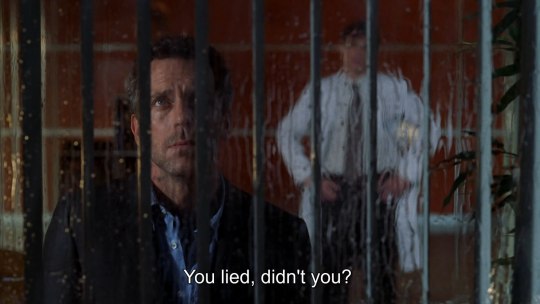

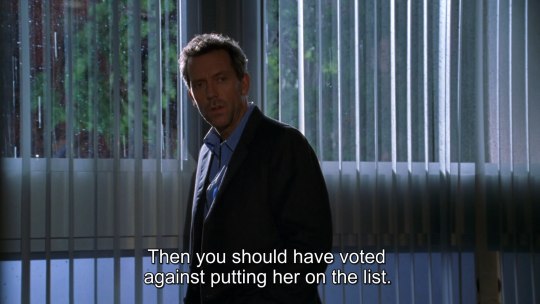
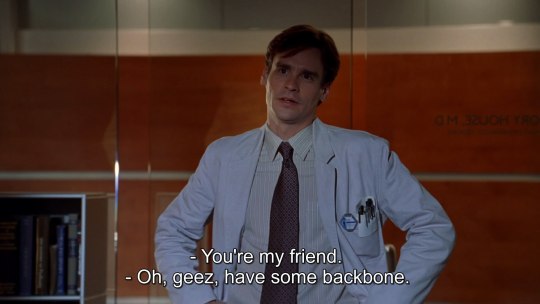
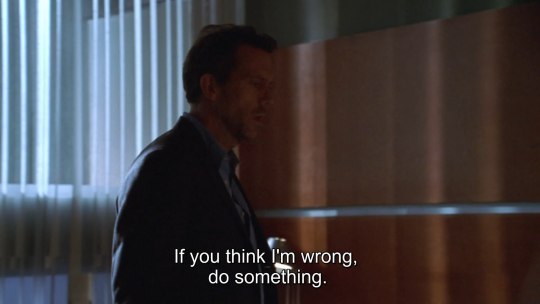
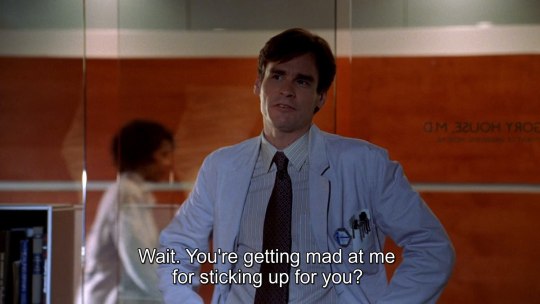
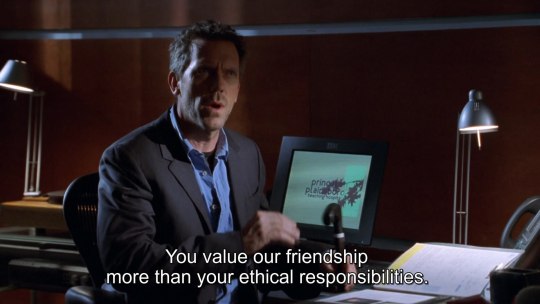
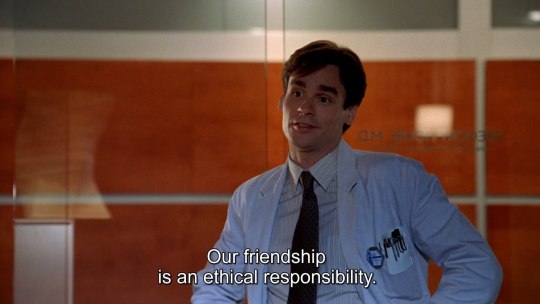
#house md#gregory house#james wilson#hilson#screencap#s01e14 “Control”#<STANCE>#HANDS. ON. HIPS.#BABYGIRL IS READY#“our friendship is an ethical responsibility”#such a good line
960 notes
·
View notes
Text
There are moments when you must ignore the rules in order to do what is right. You must keep this in mind, lest you adopt the false belief that you are always constrained by the rules. If you believe this, you might do wrong by quietly following the rules instead of doing the right thing, which also happens to be forbidden.
Read more...
73 notes
·
View notes
Text
#AI#office work#jobs#careers#my friend said bosses were going to demand people use it so we should teach ethical and responsible use of it#I was like...what bosses?#so was curious
97 notes
·
View notes
Quote
To will oneself free is also to will others free. This will is not an abstract formula. It points out to each person concrete action to be achieved.
Simone de Beauvoir, The Ethics of Ambiguity
#philosophy#quotes#Simone de Beauvoir#The Ethics of Ambiguity#freedom#will#actions#responsibility#ethics
172 notes
·
View notes
Text
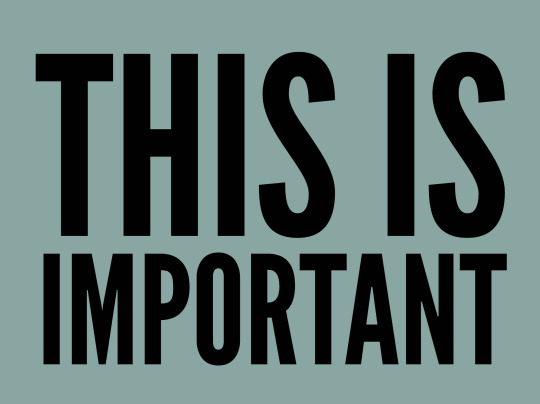
#free congo#don't forget about the congo#tesla#glencore#cobalt#nickel#human rights abuses#allegations#mining industry#renewable energy#clean energy#environmental impact#worker mistreatment#corruption#ethical sourcing#global supply chain#corporate responsibility#renewable energy transition#accountability
344 notes
·
View notes
Note
Hi Pasta! This might be kind of a weird ask but I need your help as my favorite writer and daredevil authority. I have to write a paper analyzing the ethical and moral frameworks of an organization or piece of media and of course I chose Matt Murdock. I was thinking of doing two main sections, lawyer Matt and devil Matt. I was wondering if you had any scenes or points I could make? I’m not a very good writer (this is an engineering major requirement haha) and I know you’re well versed on this subject. Any thoughts would be greatly appreciated! (I also want to connect it to todays current government issues but I’m a wee bit scared to)
FRIEND THIS ASK GOT ME LIKE
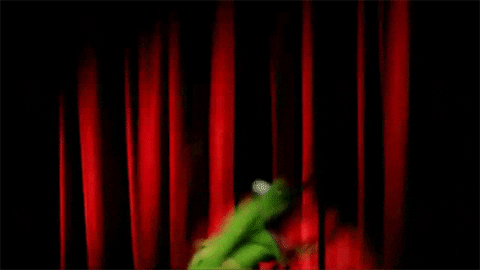
Thank you SO SO MUCH and also YOU CHOSE SO FUCKING WELL. Quite frankly I wish DD was out when I was taking my ethics class in college, my prof loved when we used pop culture scenes to illustrate key points in ethical debates, and I've thought more than once about the way I'd have come crashing in through his door holding a foam-covered stack of pages ranting about the ethical implications of Daredevil.
IN OTHER WORDS, I HAVE THOUGHTS THAT MIGHT HELP.
Firstly, you're right: Lawyer Matt and Daredevil both occupy different ethical spaces, which is wild since they're both in the same person. Those two sides are often in opposition, which obviously makes for lovely conflict since Matt's constantly struggling with finding a middle ground.
Interestingly though, a lot of what he does comes down to the same reasoning. Just with two different ways he does it.
For Lawyer!Matt, I'd argue important scenes illustrating his ethical and moral framework would be:
His entire closing statement in 'Rabbit in a Snowstorm' (Season 1 Ep 3 off the top of my head) is an excellent display of how he views the law, why he does what he does in the courtroom: "These questions of good and evil, as important as they are, have no place in a court of law. Only the facts matter. "
Season 2, episode 6 when he's convincing Foggy why they should take Frank's case to prevent Frank from getting the death penalty: "He's a person, Foggy. Like you, like me."
Season 1 ep 10, Nelson v. Murdock is rife with stuff for both Lawyer!Matt's ethics and Daredevil's, but for this one, it's worth considering how he convinces Foggy to leave Landman and Zack: "Is this what you want? To be a part of that? Protecting corporations from people that need help?"
I'd also bring up the examples in S1 and S2 where there's a ton of people who can't pay with money, and so pay with food instead. This is spread across multiple episodes, but it's a telling sign of how Matt truly does believe all should be represented, regardless of ability to pay. It's him helping his community.
For Daredevil's ethics, the three most massive, most telling scenes I'd argue are:
His argument with Frank on the rooftop, Season 2, episode 3. I love this scene so much I have it bookmarked. It is my favorite ethical argument scene ever. They're having an ethical argument that's thousands of years old. Why doesn't he kill? "What about hope?"
youtube
Another from Nelson v Murdock, where he talks about the little girl. I have this one bookmarked too, because it's another fucking amazing example of why Matt's ethics are what they are as Daredevil. He believes in the law. He does. And he believes we should be working to fix the system. But the law at present is not enough. "The law couldn't help that little girl... but I could." (SA warning for anyone who hasn't seen it)
youtube
Above episode also has the exchange between Foggy, "That isn't fair, Matt," and Matt's reply, "We don't live in a world that's fair. We live in this one. And I'm doing everything I can to make it a better place."
I'd can't remember it off the top of my head but the episode where Matt is examining Frank on the witness stand and sort of takes a sideways tangent into what this city needs. He calls out the corruption of the police, and why the city needs people who will act. He's VERY clearly talking about himself here and not just Frank.
And a tie in for both: his speech at Lantom's funeral about doing what he can for those around him.
I do think if you want to tie it into current events, you can easily do so! The corruption of the cops (S1), the writers drew inspo from a Certain Person in S3 for Fisk (iirc he even says he'll "Make Hell's Kitchen Great Again") including how he leveraged the feds for his own power, the failure of the system with Frank Castle in S2, hell, DDBA swung hard for it again with Leroy Bradford (he says something like "They're willing to spend five times more to lock me up than they are to feed me") and the entire corrupt cop plotline coming back around. The show's always been viscerally real even with the presence of enhanced abilities. Matt lives in a world very much like this one, and with a lot of the same issues. His struggle, in many ways, is ours, I wouldn't be too afraid to acknowledge that even if it's just in general terms since so much of ethics in fiction (and in Daredevil especially) is about seeing what it's trying to tell us about our own world. <3
#ask response#daredevil#matt murdock#I LOVED THIS QUESTION IT MADE ME SOOOOO HAPPY#I LOVE TO TALK ABOUT DAREDEVIL ETHICS#i wish i could have just sent my ethics professor the scene of frank and matt arguing he would have loved it#ANYWAY GOOD LUCK I HOPE THIS HELPS EVEN A LITTLE#shit like this is my favorite way of illustrating various ethical and moral concepts#and daredevil did it SO gd well
57 notes
·
View notes
Text

Soldiers in the German Army can refuse orders that violate human dignity.
#Germany#Bundeswehr#military#orders#human dignity#ethics#Innere Führung#law#responsibility#disobedience
123 notes
·
View notes
Text
i need to start collecting dead things in jars and boxes of bones i think it's the only thing that might actually fix me
796 notes
·
View notes
Text
Might not shoot a person but kill an ant; is the value of life determined by the size of the body or human-centric understandings of social contributions or responsibilities?
#Ethics#Philosophy#Anthropocentrism#Humanism#Speciesism#Value of Life#Bioethics#Moral Philosophy#Social Contributions#Responsibility#Animal Rights#Ecology#Existentialism#Environmental Ethics#Empathy#Sentience#Non-Human Life#Consciousness#Moral Dilemmas#Interspecies Ethics#Utilitarianism#Deontology#Justice#Life Philosophy#Social Constructs#Cultural Norms#Moral Relativism#Equality#Moral Psychology#Human Exceptionalism
58 notes
·
View notes
Note
Really disappointing to see such a big figure in the f1 fandom being so outspoken about supporting a movie made by a big time domestic abuser ngl
Yeah I think you bringing this up is actually a good point because it is a really big issue that I feel like people aren't really addressing (including me) and I have been thinking about this since you sent it in
Unfortunately we are fans of a sport that actively upholds sexism, racism, homophobia, and domestic abusers etc. Not to say that you shouldn't call this out, because we need to be better as a whole about holding the people involved in this sport accountable (I.e drivers who have said crazy shit, fans who have said crazy shit).
But this whole community has been losing our minds about the weird sexism in the F1 movie (rightfully so) while also celebrating Hulkenberg’s podium. Like. We exist in a vacuum
That being said, this sport is an ethical shithole. And I think as supporters of this sport we can't really begin cherry picking what's ethical or what's not because the entire thing is a problem.
I wish I knew how to respond to this in a more articulate way other than “it all sucks”
In conclusion: you should be disappointed, and you should call me out for it. But also, as a creator in a sport that’s extremely unethical it’s hard to maneuver ethics? If that makes sense? I didn’t pay to see this movie, and I also told people to avoid watching until it was on streaming and discussed the sexism and issues. BUT I also gave it a platform and gave it my time. I dont know. Im going to think about it and circle back probably but I just wanted to respond because its important to take accountability about the things I care about as a leftist and feminist woman in this sport
#this is so convoluted I’m sorry#also i really dont mean for this to come across as like. deflection or trying to make excuses#I just do think that it’s a really nuanced topic and it’s something that we do need to discuss as a community#bc I’m not the only person in this community that has seen this movie#so it needs to be a communal discussion#god I wish I was more articulate I just feel like I made no points here#I’m gonna sit on this one and maybe circle back#but genuinely I think this is a really important discussion and I’m sorry for how shitty my answer is#I dont want to be that person that’s like If You Only Watch Ethical Movies Youll Have Nothing To Watch bc YIKES but there is truth there#idk#I am a hashtag theatre hopper so this film has received no money from me to be clear. but the asker is right bc I have given it a platform#ask Anni#can’t wait to hear the response to this one#f1 movie
25 notes
·
View notes